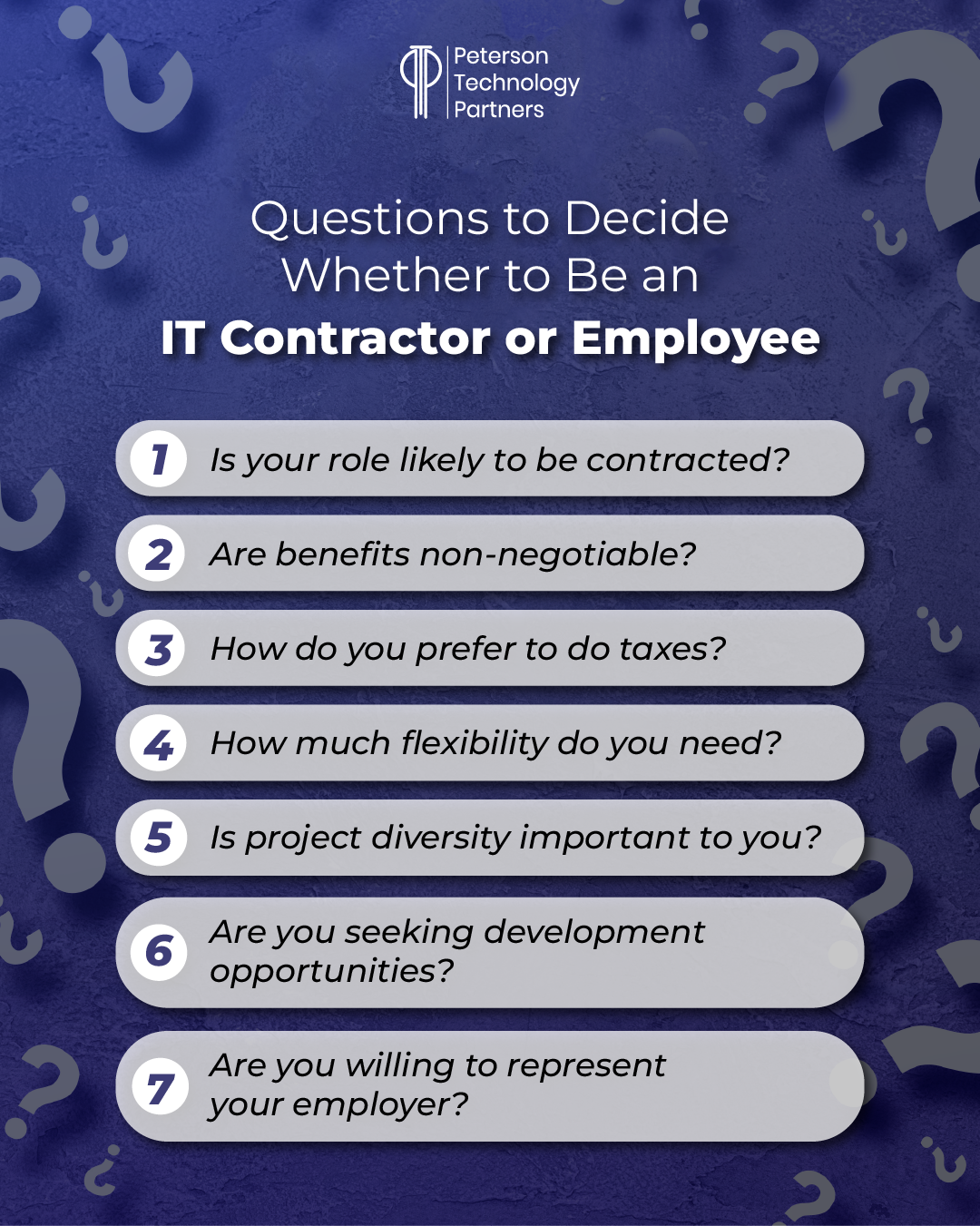Introduction
In such an unpredictable hiring market—where power shifts back and forth between employers and professionals (and… robots?)—the tech job search continues to evolve in out-of-the-box ways.
One of these areas in which tech hiring is currently shifting is in how hires are classified. According to Robert Half’s 2025 Tech and IT Salaries and Hiring Trends, 47% of tech employers are engaging skilled contract talent to fill critical skills gaps—the third most popular solution behind upskilling (58%) and reskilling (52%) existing employees.
This is useful insight for tech job seekers, who may benefit from considering contract work. But becoming an IT contractor isn’t a silver bullet for tech employment. Make sure it’s the right move for your career, considering factors like specific role demands, compensation needs, and long-term career goals.
Make your decision easy. Scroll through our key questions to decipher whether being an IT contractor vs employee is the best choice for you.

1. Is your role likely to be contracted?
If you’re considering IT contract work vs full-time employment, you first need to know if your desired role is likely to be contracted in the first place. That’s why researching the IT hiring trends of 2025 is critical.
According to Robert Half, tech employers are most likely to contract the following professionals:
- AI and machine learning (38%)
- Security, privacy, and compliance (27%)
- Software and applications development (27%)
- Data analytics, business intel, and reporting (27%)
Of course, these aren’t the only kinds of tech roles that get contracted. Take the time to do your own research by looking at various tech job boards.
2. Are benefits non-negotiable?
If benefits like health insurance and paid vacations are a priority in your job search, then contracting is likely not the way to go.
As a full-time employee, you’re likely to receive a benefits package, along with a bigger sense of security in general (though this is not a given). Meanwhile, if you’re an independent contractor, you technically work for yourself and therefore do not receive any benefits from the company.
Note: If you are a part-time employee, you aren’t a contractor, but you still won’t get the same benefits you would as a full-time employee.
3. How do you prefer to do taxes?
In a similar vein, it’s important to consider the differences in how employees and contractors do their taxes.
An official employee, whether part or full–time, receives a W-2 tax form, which allows them to automatically deduct tax money from every paycheck.
Meanwhile, an independent contractor receives a 1099 form, which means they are responsible for paying taxes on their own, as they are technically self-employed.
For someone who gets easily overwhelmed by taxes, a W-2 tends to be easier to take care of. However, if you are financially savvy, or if you have an accountant, you might prefer the 1099 route.
When in doubt, ask for advice from people who are experienced in this area, whether a professional, family member, or friend.
4. How much flexibility do you need?
Contract positions are far more likely to offer a flexible work environment. Not only are contractors more likely to find remote work, they also don’t have to dedicate the same amount of time and effort to onboarding and training in their new role.
Instead, they are hired as experts in their field, expected to jump in without much training or orientation to the company. Some hiring teams and recruiting firms still onboard and train with care, even for contractors.
At PTP, for example, onboarding is part of our recruitment process, for both employees and contractors. We believe investing in this step improves client and candidate satisfaction, as it ensures alignment of culture and overall expectations.
[Which IT contract roles are most in demand? Find out in this PTP Report!]
5. Is project diversity important to you?
Many IT professionals prefer contracting because it allows them to work on a wide range of project types.
For example, a developer may not want to focus all their time on one kind of application, and contracting gives them the freedom to take on many diverse, shorter-term projects that tap into their multiple interests.
Not only that, building a diverse tech portfolio is a great way to improve career durability in an unstable IT hiring landscape.
If you care less about working on a bunch of different projects, you may want to seek full-time or part-time employment so that you can grow with a company. This is especially the case at tech startups, which may have more opportunities for growth and challenges.
6. Are you seeking development opportunities?
Speaking of growth, seeking employment over contract work may be better for professionals looking for long-term career development.
As an employee, you are more threaded into the culture of the organization, giving you more opportunities to connect with other employees and leaders. This can be invaluable both to learn new skills and build career-strengthening connections.
This is not to say contracting gigs won’t help you grow your career. As mentioned, having a variety of projects can spruce up your portfolio and resume, especially if you’re learning new concepts and skills along the way. It may just be a matter of how you prefer to learn and how you relate to others in a professional setting.
7. Are you willing to represent your employer?
One final point to consider when deciding whether to be a contractor or employee in tech is whether you are willing to represent your employer.
It may seem like a small consideration at first, but ask yourself: Do you want your LinkedIn tagline to prominently feature their company name—or would you rather present yourself as your own boss?
When answering these questions, consider factors like:
- Whether your values strongly align with the organization’s
- Whether your experience at the specific company will attract future employers
- How important it is to build lasting relationships with others at the company
- Whether you want to participate in team activities (especially if you’d be featured in the company’s social media, for example)
Contract to Hire (C2H) Roles at PTP
Contract to hire, or C2H, roles are an attractive option for both employers and professionals, as they offer a chance to try out an arrangement before committing.
At PTP, we have many contract-to-hire IT roles for candidates, where they can get hired as a contractor, work with a company for a set period, then have the opportunity to join as a full-time or part-time employee.
Before accepting a C2H position, just make sure you can actually see yourself working in the role full-time and, conversely, are prepared for the possibility that you won’t get offered a full-time position.
[Learn more about contract-to-hire roles in this PTP Report.]
Conclusion
By understanding the differences between each career path, you can effectively map out your own personal pros and cons of IT contracting vs employment. And of course, be sure to stay on the pulse of tech hiring trends by subscribing to The PTP Report!
FAQs
How do you chart a sustainable IT contractor career path?
Understanding how to become an IT contractor is simple; you just make sure you have the right qualifications and apply. But crafting a sustainable, lucrative tech contractor career requires a little more thought. For example, you may have to find out-of-the-box ways to make long-term connections and learn new in-demand tech concepts—i.e., contributing to open-source IT projects, participating in hackathons, attending conferences, and building a social media brand.
Who typically earns higher salaries between IT employees and contractors?
While many professionals report receiving higher compensation for contract roles, there are no hard and fast distinctions in tech employee vs contractor salaries. That said, even if full-time employees seemingly make less money than contractors, they are more likely to receive benefits like healthcare and career development opportunities.
What is the difference between an IT consultant vs employee?
An IT consultant is either an individual contractor or an employee for an IT consultancy firm. Their purpose is to guide clients through specific technological challenges, often helping an organization make the most of new technology. PTP Consulting, for example, is comprised of a team of IT consultants in AI/ML, web development, Salesforce, CRM, campaign management, and customer support.





